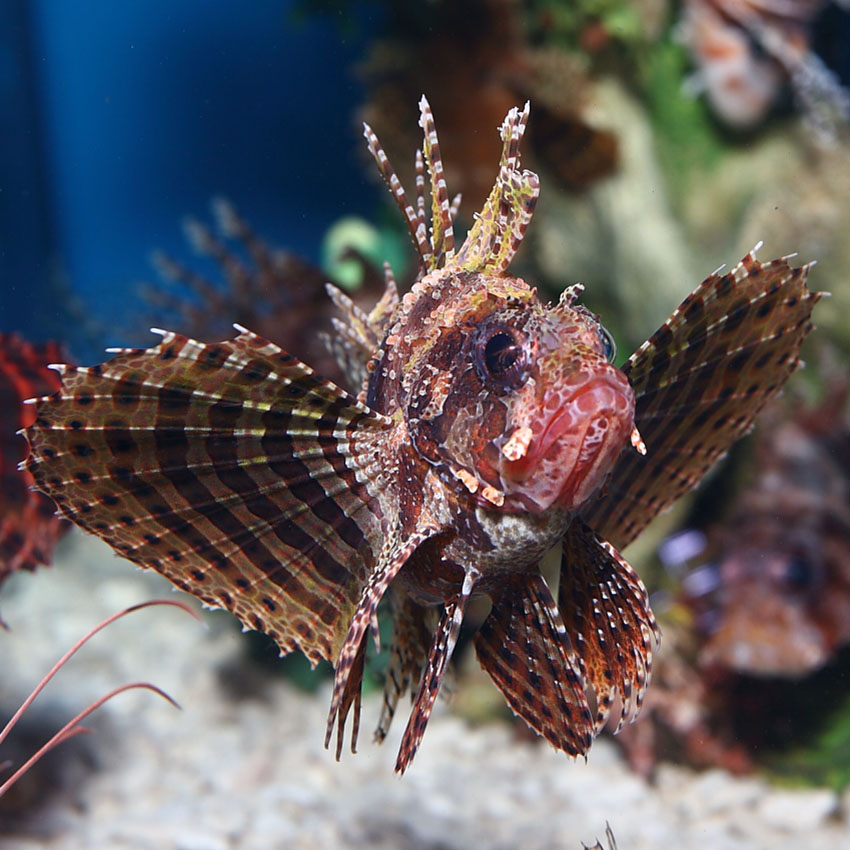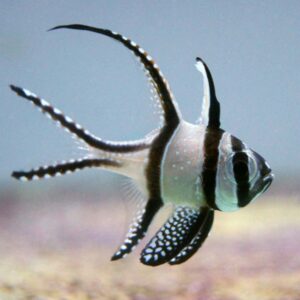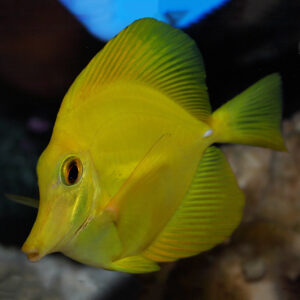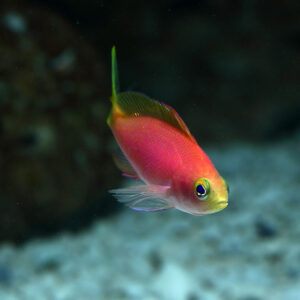The Fuzzy Dwarf Lionfish, Dendrochirus brachypterus, are also named Shortfin Lionfish. This is a captivating fish with a unique appearance. It is a relatively small lionfish species, reaching a maximum size of around 6 inches (15 cm) in length. This species features elongated, feathery pectoral fins, which give it a fuzzy or frilly appearance. Its body is adorned with vibrant red, white, and black stripes, creating a striking contrast. These fish are venomous so it is best to exercise caution when handling.
Taxonomy
Dendrochirus brachypterus belongs to the genus Dendrochirus, which is part of the family Scorpaenidae. The Scorpaenidae family consists of numerous venomous fish species. The Fuzzy Dwarf Lionfish shares its genus with other lionfish species, such as the Zebra Lionfish (Dendrochirus zebra) and the Antennata Lionfish (Dendrochirus antennatus). Its closest relatives are the other members within the same genus.
The scientific name, Dendrochirus brachypterus, has an etymology rooted in Greek. “Dendrochirus” translates to “tree hand” and refers to the fish’s frilly pectoral fins resembling tree branches. “Brachypterus” means “short-winged” and alludes to the species’ relatively short dorsal and anal fins.
Natural Habitat
In its natural habitat, the Fuzzy Dwarf Lionfish typically inhabits coral reefs and rocky areas. It seeks shelter among crevices, caves, and coral formations during the day. These environments provide the fish with suitable hiding spots to camouflage itself and wait for unsuspecting prey. The lionfish’s colours and patterns blend well with its surroundings, enhancing its chances of successful hunting.
Keeping the Fuzzy Dwarf Lionfish Healthy:
Caring for the Fuzzy Dwarf Lionfish requires attention to detail due to its specific needs. This species is considered moderately challenging to care for. It thrives in aquariums with stable water parameters and high water quality. The water temperature should be maintained between 75°F and 82°F (24°C to 28°C), and the pH level should be kept within a range of 8.1 to 8.4. Regular water testing and appropriate filtration are crucial for their well-being.
Special Requirements and Feeding
The Fuzzy Dwarf Lionfish is a carnivorous predator that feeds on small fish and crustaceans in the wild. In an aquarium setting, it should be offered a varied diet consisting of meaty foods, such as live or frozen shrimp, fish, and crustaceans. It is important to provide them with appropriately sized prey. Regular feeding and a balanced diet are essential for their overall health and vitality.
How Many Should I Keep?
Due to their solitary nature, it is recommended to keep only one Fuzzy Dwarf Lionfish in a tank unless you have a considerably large aquarium with ample hiding places. These lionfish are territorial and may exhibit aggression towards conspecifics (members of the same species). Ensuring adequate space and territory for each individual is crucial to minimize stress and aggression.
Hunting Method
The Fuzzy Dwarf Lionfish is an ambush predator. It patiently waits for its prey to swim by, using its frilly pectoral fins to disguise itself among coral or rocky structures. Once within striking distance, it rapidly extends its mouth and engulfs the prey, aided by its expandable stomach. This hunting strategy allows the lionfish to capture a wide range of small fish and invertebrates.
Lighting Preference
The Fuzzy Dwarf Lionfish prefers moderate to low lighting conditions
Suitable Tank Mates
When selecting tank mates for the Fuzzy Dwarf Lionfish, caution must be exercised. They may view smaller fish as potential prey, leading to aggression or predation. It is advisable to choose tank mates that are larger and too large to be considered prey. Compatible tank mates may include other larger predatory fish, such as groupers or larger angelfish. However, it is essential to monitor their behaviour closely to ensure compatibility and minimize aggression within the tank.
Reproduction in the Wild
In the wild, the Fuzzy Dwarf Lionfish, scientifically known as Dendrochirus brachypterus, reproduces through a process called spawning. Spawning refers to the release of eggs and sperm into the water column, where fertilization takes place externally. Lionfish, including the Fuzzy Dwarf Lionfish, exhibit a complex reproductive behaviour that involves courtship rituals and subsequent care for the eggs and offspring.
Breeding Dendrochirus brachypterus
Breeding the Fuzzy Dwarf Lionfish in captivity can be a rewarding but challenging endeavour. Here is a detailed overview of the breeding process:
To initiate breeding, a separate breeding tank should be set up. The tank should provide appropriate hiding places and structures for the fish to lay their eggs and for the subsequent protection of the eggs and fry. Water quality parameters, including temperature, salinity, pH, and filtration, should be closely monitored, and maintained within optimal ranges suitable for the species.
Courtship and spawning in the Fuzzy Dwarf Lionfish typically begin with elaborate courtship displays. The male lionfish initiates the courtship process by displaying vibrant colours, erecting its dorsal fin, and performing intricate swimming patterns. The male then entices the female towards a suitable nesting site.
During spawning, the female releases a mass of eggs into the water, while the male simultaneously releases a cloud of sperm to fertilize the eggs. Fertilization occurs externally, and the fertilized eggs become buoyant, rising towards the water’s surface.
After successful fertilization, the eggs float at the water’s surface, forming a gelatinous mass. It is essential to monitor and maintain optimal water conditions during this period to ensure the survival and development of the eggs. The eggs usually hatch within 48 to 72 hours, depending on water temperature.
Once hatched, the fry, known as larvae, are transparent and have a yolk sac for nourishment. They will gradually develop and start to exhibit characteristics resembling miniature adult lionfish. Proper feeding and suitable food sizes are crucial during the rearing process to ensure the healthy growth and survival of the fry.
Sexual Dimorphism
Sexual dimorphism refers to the physical differences between males and females of a species. In the case of the Fuzzy Dwarf Lionfish, sexual dimorphism is not easily discernible based on external characteristics alone. Males and females generally have similar appearances, with both exhibiting the frilly fins and vibrant colouration characteristic of the species. Additional internal examination or DNA testing may be required to determine the sex of individual lionfish.
Distribution
The Fuzzy Dwarf Lionfish, Dendrochirus brachypterus, is naturally found in the Indo-Pacific region, specifically in the waters around the Maldives, Sri Lanka, and the Andaman Sea. While there may be captive-bred or line-bred strains of the Fuzzy Dwarf Lionfish available in the aquarium trade, the original wild fish originates from the aforementioned areas in the Indo-Pacific.
Summary
The Fuzzy Dwarf Lionfish, scientifically known as Dendrochirus brachypterus, exhibits fascinating reproductive behaviour in the wild and can be bred in captivity under suitable conditions. Through courtship rituals and the release of eggs and sperm into the water column, spawning occurs, leading to the development of fertilized eggs and subsequent hatching of fry. Proper set-up, monitoring of water parameters, and appropriate care during rearing are essential for the successful breeding of this captivating species.
Please note that breeding lionfish can be a complex and demanding task that requires experience and knowledge. It is advisable to seek guidance from experts or consult specialized literature.
Dry Goods Delivery.
The store has provided information regarding their order dispatch and estimated delivery times. Here are the key details:
- Dispatch Timeframe: Orders placed before 2pm will be dispatched on the same day. Orders placed after 2pm will be dispatched on the next working day.
- Delivery Date and Time Guarantee: While the store aims to dispatch orders promptly, they cannot guarantee a specific delivery date and time. As the delivery process relies on couriers, there may be factors beyond their control that could affect the delivery timeframe.
- 1st Class Mail: For orders sent via 1st Class mail, the aim is to have them delivered on the next working day after dispatch.
- 2nd Class Mail: Orders sent via 2nd Class mail typically take approximately 2-3 working days for delivery after dispatch.
- APC Next Day Delivery: APC Next Day delivery is available for UK mainland postcodes. It is usually delivered on the next working day after dispatch. However, please note that items being delivered to more remote areas may require additional time for delivery.
It’s important to keep in mind that while the store strives to provide efficient delivery services, unforeseen circumstances or external factors could potentially impact delivery times. For further details or specific inquiries about delivery, customers should refer to the store’s terms and conditions or contact the store directly.
Livestock Delivery.
The store maintains specific policies regarding the delivery of livestock. Here are the key points:
- Licensed Livestock Courier: The store exclusively uses a licensed livestock courier for shipping fish and coral. This approach is chosen to ensure responsible and ethical transportation of the livestock.
- Livestock Shipping Fee: The livestock shipping fee charged to customers of £19.99 does not cover the true cost, and therefore, there is a minimum spend requirement of £30.00 before the option for livestock shipping becomes available.
- Pre-Arranged Delivery: The store never ships livestock without first arranging a suitable delivery day. Before dispatching the livestock, the store must confirm the agreed-upon delivery day with the customer.
- Saturday Delivery Confirmation: Customers who choose Saturday delivery must have their availability confirmed for the upcoming Saturday before the store sends out the livestock. This confirmation ensures that the livestock can be received promptly.
- Failure to wait for livestock: Not waiting for livestock, even if there is a reasonable delay, or cancelling an order after it has been dispatched will lead to you incurring charges for an emergency return to the base. Additionally, any losses of livestock will also be charged to you. Please be aware that the items you are ordering are living creatures – livestock. We kindly ask that you refrain from ordering livestock if you are unable to accommodate the possibility of a delayed delivery.
These terms and conditions are a fundamental aspect of our policy. Our primary goal is to dissuade individuals who could react negatively to a delayed delivery and subsequently request order cancellations. It is of utmost importance to underscore that your order pertains to living creatures, not mere inanimate objects. In the event of an occasional delay, it is crucial that you respond in a rational and responsible manner, taking into account the welfare of the livestock. We kindly request that you refrain from placing an order for livestock if you tend to react strongly to such situations. By proceeding with the order of livestock, you indicate your acceptance and agreement to abide by these specified terms and conditions.
- Signature Requirement: Livestock deliveries require a signature upon receipt and cannot be left in a safe location. This precaution ensures proper handling and the well-being of the livestock.
- Geographic Restrictions: The courier has strict geographic restrictions for livestock deliveries. Unfortunately, deliveries to Northern Ireland, Republic of Ireland, Isle of Man, Isles of Scilly, Channel Islands, and certain Scottish offshore postcodes may not be possible. Customers are encouraged to contact the store via email to confirm if livestock delivery is available in their area.
- Minimum Order Value and Order Cancellations: The store has a minimum order value of £30 for livestock shipping. Additionally, the store reserves the right to cancel orders that are deemed high-risk or involve a high number of single tropical freshwater fish species.
It is essential for customers to familiarize themselves with these policies before making a purchase. For more detailed information or specific inquiries, customers should consult the store’s terms and conditions or reach out to the store directly for clarification.
Livestock Geographical Exemptions.
The store has specific geographical exemptions for livestock deliveries. Here is a list of the areas and postcodes where livestock delivery is not available:
- Islands: Livestock cannot be delivered to the Shetlands, Channel Islands, and Isle of Man.
- Postcodes: Livestock delivery is not available to the following postcodes:
- AB30 to AB39, AB41 to AB45, AB51 to AB56
- DD8 to DD10
- BT all
- DG3 to DG9, DG12 to DG14
- KA18 to KA19, KA26, KA29 to KA30
- HS all
- IM all
- JE all
- ZE all
- KW15 to KW17
- TD9
- FK17 to FK21
- GY all
- KA26, to KA28
- PA20 to PA38, PA41 to PA49, PA60 to PA61, PA76 to PA78
- TR21, to TR25
- PH3 to PH26, PH30 to PH44
- IV all
Customers residing in these areas should be aware that livestock delivery is not available to their location.
We can ship livestock to the Isle of Wight, this area is subject to a surcharge.
For further information or specific inquiries about livestock delivery to a particular area, customers are advised to contact the store directly for clarification.
Cancellation.
According to the store’s policy, customers have the right to cancel an order within 14 working days of receiving the goods. To initiate the cancellation, the goods must be returned to the store in new and unused condition, adhering to their Returns Policy.
Important points regarding the return process are as follows:
- Return Condition: The goods must be returned in new and unused condition, as originally received. It is important to ensure that the goods are in the same condition as when they were sent out.
- Return Timeframe: The goods must be received by the store within 21 days of notifying them about the cancellation. During this time, customers are responsible for any loss or damage that may occur during the return shipping process.
- Refund Process: Once the store receives the goods in new and unused condition, they will initiate the refund process. The purchase price will be refunded to the customer.
- Return Condition Inspection: If the returned goods arrive in a condition that is less than what they were sent out in, the store reserves the right to return the goods to the customer, and no refund will be processed.
It is essential for customers to carefully review the store’s Returns Policy and follow the specified procedures to ensure a smooth and successful return and refund process. For more detailed information or specific inquiries, customers should consult the store’s terms and conditions or contact the store directly.
Returns.
According to the store’s return policy, the following guidelines should be followed for returning goods:
- Use Returns Form: Customers need to use the store’s provided returns form to initiate the return process. This form helps the store acknowledge that the goods are being sent back.
- Return for Testing: If the goods are being returned for testing, the customer is responsible for covering the return shipping expenses.
- Refund of Postage Fees: The store will only refund postage fees if the order arrives damaged or becomes faulty within the first 4 weeks of purchase. Proof of posting is important, and customers should ensure the goods are well-packed and obtain proof of posting as the goods remain their responsibility until received by the store.
- Refund of Postage Costs for Replacement: If goods are being returned within 7 days of purchase under the Replacement Policy, the store can refund postage costs. However, the customer needs to agree on a delivery service with the store in advance, and only standard or tracked shipping fees will be refunded. The store cannot refund the cost of any special delivery service.
- Non-Refundable Postage: Postage costs for goods returned for any other reason than those mentioned above are non-refundable. The store reserves the right to deduct the original postage cost from any applicable refund.
- Mistaken Purchases: If a customer has made a mistake in their purchase, they need to return the goods to the store. The customer is responsible for the return shipping costs in such cases.
It is important for customers to carefully follow the store’s return procedures and terms and conditions. For further details or specific inquiries, customers should refer to the store’s website or contact the store directly.
Replacements
If customers receive faulty goods, the following guidelines apply according to the store’s policy:
- Notification of Faulty Goods: Customers must notify the store within 7 working days if they receive faulty goods. This notification should be made as soon as possible.
- Replacement Parts: If possible, the store will dispatch replacement parts for the faulty goods.
- Return of Goods: If replacement parts are not possible, the store may request customers to return the faulty goods in accordance with their Returns Policy. The specific return procedures and conditions should be followed.
- Verification of Damage: Once the store receives the returned goods, they will verify the damage. If the damage is confirmed, the store will supply the required replacements.
- Return Postage Costs: If the goods returned to the store are found to be in good working order, the store is not able to refund the return postage costs. Additionally, the store reserves the right to deduct their original postage cost from any applicable refund.
- Consequential Loss or Damage: The store cannot take responsibility for any consequential loss or damage that arises directly or indirectly from the goods supplied.
Customers should carefully review and adhere to the store’s Returns Policy and procedures for returning faulty goods. For further clarification or specific inquiries, customers should consult the store’s terms and conditions or contact the store directly.
Manufacturer’s Guarantees
The store works in collaboration with manufacturers to ensure that their guarantees are honored, and they make their best efforts to resolve issues within the warranty period. The following guidelines apply to refunds and replacements:
- Postage Costs under Manufacturer’s Guarantee: Postage costs can only be refunded if the goods are returned to the store within 7 days of the original purchase, as per the manufacturer’s guarantee.
- Refund of Postage Costs for Faulty Goods: The store will refund postage costs for guarantee/warranty returns only if the product becomes faulty within the first 4 weeks of receipt.
- Replacements with Manufacturer Authorization: Replacements, whether parts or goods, can only be offered when authorized by the manufacturer. Customers should contact the store for further guidance in such cases.
- Prior Approval for Returns: Goods should not be returned to the store without prior approval. Customers need to contact the store and obtain approval before returning any items.
- Replacement of Glass or Ceramic Items: Glass or ceramic items can only be replaced if the store is notified within 48 hours of receiving the delivery.
- Replacement of Glass Bulbs/Tubes: Glass bulbs or tubes can only be replaced if they become faulty within 14 days.
Customers should note and adhere to these guidelines to ensure a smooth and efficient resolution of any issues with their purchased items. For specific inquiries or further information, customers are advised to refer to the store’s terms and conditions or contact the store directly.
Breakages
According to the store’s policy, customers have the following responsibilities regarding breakages:
- Checking Goods on Arrival: It is the customer’s responsibility to thoroughly check the goods upon arrival for any damage. This should be done before signing for the parcel. If the parcel appears damaged, it is advised not to sign for it.
- Reporting Breakages: Any breakages or damages must be reported to the store within 48 hours of receiving the goods. It is important to promptly notify the store to initiate the resolution process.
By carefully inspecting the goods upon arrival and reporting any breakages within the specified timeframe, customers can ensure that appropriate actions are taken to address the issue. For specific instructions on reporting breakages or further information, customers should refer to the store’s terms and conditions or contact the store directly.





Reviews
There are no reviews yet.